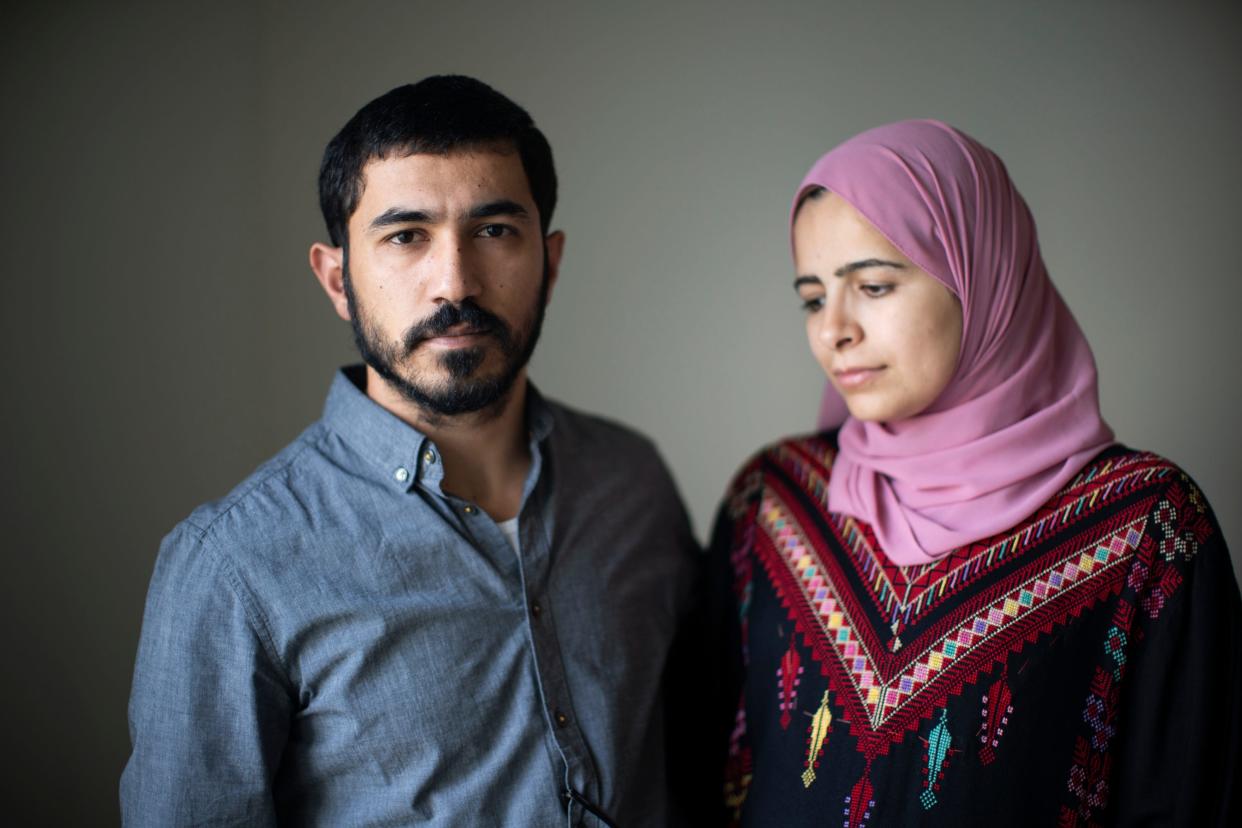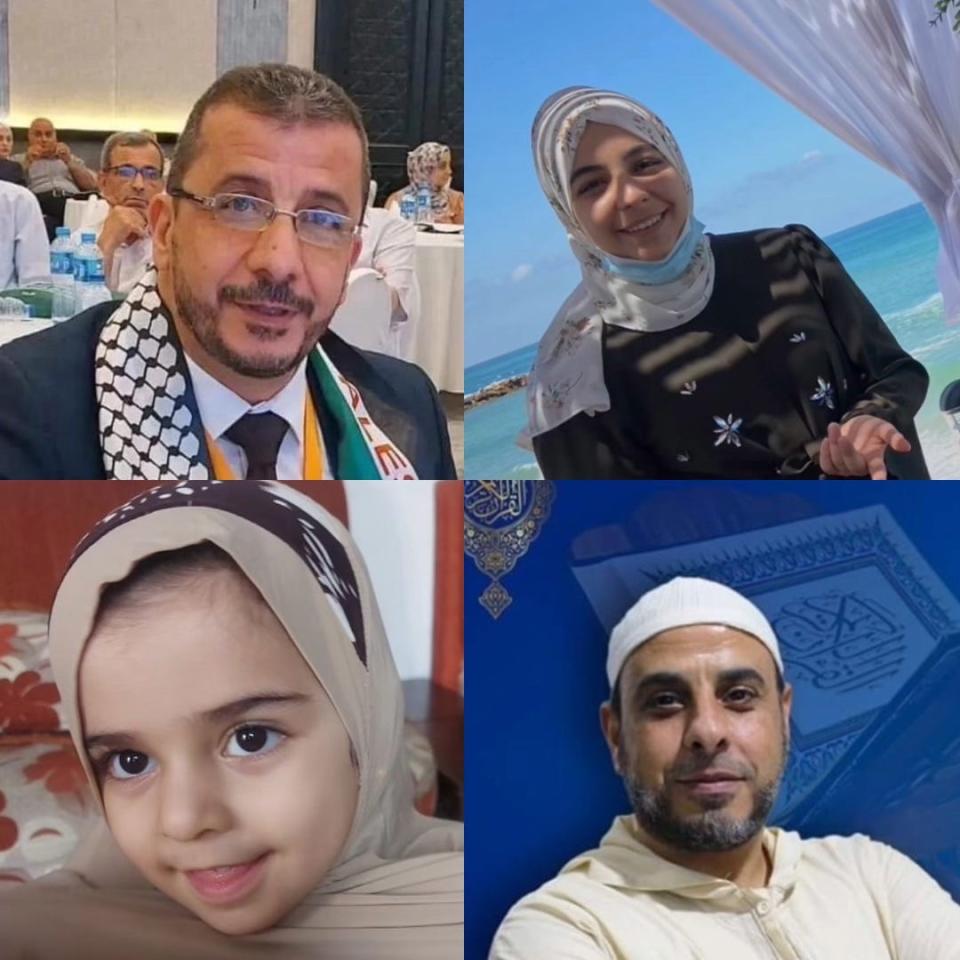Saying they've lost relatives to airstrikes, Palestinian Ohioans call for Gaza ceasefire

Rosan Eldadah, an Upper Arlington-based real estate broker, said she lost her uncle, a well-known Palestinian medical doctor — along with five other family members — in an Israeli airstrike in Gaza.
“He was a walking angel on this earth,” Eldadah said of Dr. Rafat Lubbad, a head of internal medicine at Gaza City’s Al Shifa Hospital, who was killed on Nov. 18.
Eldadah was among a half-dozen Palestinian Americans who spoke at a news conference Monday in Hilliard organized by the Ohio chapter of the Council on American-Islamic Relations (CAIR-Ohio). Several speakers said they had lost family members in the Israel-Hamas war, and they spoke against the Biden administration’s military support of Israel, as well as its recent veto of a United Nations Security Council resolution calling for an immediate ceasefire.
“Don't take my own tax money that I paid to kill my family,” said Mahmoud Algharabli, 31, a Palestinian American pharmaceutical researcher from Dublin.
“Our military aid, support and funding are contributing … and enabling the perpetration of this crisis,” said Amina Barhumi, CAIR-Ohio’s executive director.
The Israeli invasion of Gaza followed an Oct. 7 attack in which Hamas killed around 1,200 people — including about 845 civilians — and took hundreds hostage into Gaza. According to evidence presented to the U.N. last week, some Hamas fighters also brutally sexually assaulted Israelis. Since the Israeli invasion, more than 17,000 Palestinians in Gaza have been killed, according to the Gazan Health Ministry — the majority of them women and children. (The health ministry is run by Hamas, though a recent study in the medical journal The Lancet found no evidence of inflated mortality reporting.)
The U.N. cease-fire resolution garnered support from all Security Council members except the United Kingdom (which abstained) and the U.S., which has continued to provide Israel military aid.
Robert Wood, the American ambassador to the U.N., justified the veto by saying a ceasefire would enable Hamas to continue holding hostages and remain in control of Gaza.
“As of today, Hamas continues to pose a threat to Israel,” he said in a statement to the council.
The Biden administration also recently bypassed Congress to provide artillery as it seeks congressional approval for a larger aid package for Israel.
Amy Shuster, a representative of Jewish Voice for Peace's Central Ohio chapter — which describes itself as “a progressive Jewish anti-Zionist organization” — used the term “ethnic cleansing” to describe Israel’s actions in Gaza. She warned against conflating opposition to Israel with antisemitism.
“I was taught about Jewish history and the genocide of the Holocaust, and I learned the phrase, ‘Never again.’ And I thought it meant ‘never again for anyone,’” she said.
Eldadah, the real estate agent, said two of her uncles, an aunt and three first cousins were killed in three consecutive missile attacks on their family home in Gaza City on Nov. 18.

“Despite having no connections to military activities, no affiliation with Hamas at all, my family has become targets,” she said in an interview with The Dispatch. “We are a family of scholars, doctors, engineers.”
Dr. Lubbad, the internist, had earlier fled to southern Gaza to comply with Israeli evacuation orders. He returned to the north to carry out vital medical work, according to Eldadah.
Dr. Tarek Loubani, a Palestinian Canadian doctor and professor at Western Ontario University, said on Twitter/ X that Lubbad was a “a titan of internal medicine, a visionary who patiently corrected me in matters of medicine in the ER & strategy outside of it.”
The Dispatch earlier reported about another local Palestinian American family who lost cousins in Gaza in October.
Mazen Rasoul, a Columbus-based attorney and community leader, said at the news conference that an immediate ceasefire is necessary as “the first step to reach an end of Israeli occupation.”
“We call on all institutions in the U.S. to join the calls for BDS — boycott, divestment and sanctions — as the only nonviolent, civil means to put pressure on the Israeli government.”
Eldadah said her major concern currently is how to get her surviving cousins out of Gaza.
“Six of my cousins are orphaned, and we need to figure out how to get them here,” she said.
Peter Gill covers immigration, New American communities and religion for the Dispatch in partnership with Report for America. You can support work like his with a tax-deductible donation to Report for America at:bit.ly/3fNsGaZ.
pgill@dispatch.com
This article originally appeared on The Columbus Dispatch: Palestinian Ohioans call for ceasefire in Gaza

